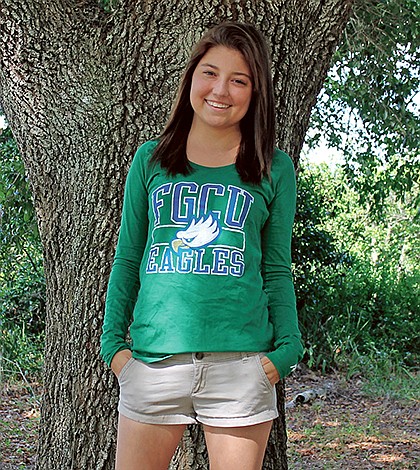- April 19, 2024
-
-
Loading

Loading

Because she was diagnosed with a rare kidney disease when she was just 2 years old and endured a transplant at age 11, Makenzie Whitaker knows what it’s like to blow out birthday candles from a hospital bed and spend Halloween trick-or-treating along the sterile hallways. She knows how it feels to spend hours hooked to a dialysis machine with such a compromised immune system that she had to spend most of senior year at home with a tutor.
Because of these lifelong medical experiences, Whitaker, 18, decided to study art therapy — ultimately working with children confined to a hospital — when she begins classes at Florida Gulf Coast University this week.
She’s ready to live in a dorm and join the yoga club and be a “normal” college student, she said.
“I’m looking forward to actually being able to start my future,” she said. “It seemed so far away (while I was) going through everything and so impossible. … It’s really exciting that it’s actually happening and that I can actually go and be the person I want to be while going through a terminal illness.”
A few of her biggest supporters aren’t quite as ready. It’s going to be a tough transition for her siblings, Kaycie and Gage, and her parents.
“It’s bittersweet as a mom to work hard to get to this point, really just for her to survive, but I know she’s responsible,” mom Melissa Massa Whitaker said. “In this last year — and, in hindsight, it was a blessing — she was at home and learned how to administer and order her medications and basically be an adult.
“Makenzie is so responsible and is so prepped with all the adversity she’s going through that she has a good head on her shoulders and is ready for the future,” she said. “I’m in complete awe of her.”
MAKENZIE’S JOURNEY
A life of medications, hospital visits and dialysis machines began early for Makenzie Whitaker. In 1999, her mother noticed her toddler’s hands and arms were swollen, and her chest looked thicker. A doctor’s visit turned into a trip to the hospital and a referral to a kidney specialist.
Makenzie was diagnosed with a kidney disease called Nephrotic Syndrome, Minimal Change Disease, in which large amounts of protein are lost in the urine. (She was later diagnosed with a secondary category of this disease, focal segmental glomerulosclerosis, where parts of her kidney filters become scarred.) Doctors expected her to be in remission in about six weeks, but that didn’t happen.
By 2001, Makenzie’s kidneys were dying inside her, and she was added to the national organ transplant list.
Family and friends held multiple events to raise enough funds for a transplant. Meanwhile, the little girl waited, ultimately having surgeries to remove one then both of her kidneys. Dialysis followed.
Her mother and her father, Paul Whitaker, both of whom grew up in Ocoee, were tested to see if either was a match. He was, and in October 2004 the Ocoee firefighter gave his daughter the gift of life, for a second time.
The 7-year-old spent the next year in and out of the hospital as doctors regulated her medicine. Melissa Massa Whitaker said that from age 9 to about 17, Makenzie’s health was fairly normal.
She joined a hospital support group for kidney transplant recipients and became close friends with people who have had similar experiences.
She has also learned not to be “weirded out” by the fact that she carries around one of her dad’s kidneys.
“A lot of people in the support group have cadaver kidneys, so they don’t know where theirs came from,” Makenzie said. “So it’s really special to tell the story and know where mine came from.”
SETBACKS
At the beginning of her senior year, she wanted to participate on her high school swim team and went to the doctor for a physical. Instead of getting the go-ahead, she was told her body was showing initial signs of organ rejection, and her parents were notified that she could need another kidney transplant.
“It was very stressful to know that we were going backward again and we were going to have to go through again what she went through when she was younger,” Melissa Massa Whitaker said.
A transplant wouldn’t be necessary, but the teen spent months at Arnold Palmer Hospital for Children trying different treatments to fight the rejection.
Because her immune system was shut down, Makenzie missed most of her senior year at Tavares High School. Her guidance counselor and a hospital homebound instructor kept her on track, and on May 29, she donned her cap and gown and participated in the graduation ceremony with her peers.
A transplant team at Tampa General Hospital will closely monitor Makenzie once she’s at college. Today, she remains on five different medications.
In just the last year, the Whitakers have incurred $37,000 in hospital medical bills. Makenzie has set up a fundraising page to help pay some of the debt, and it can be found at gofundme.com/makenzie2204.
“People going through this sometimes think they can’t do this (live a normal life and go to college) because they don’t know what will happen,” Makenzie said. “But I’ve been through this, and I’m going to go for it.”
Contact Amy Quesinberry Rhode at [email protected].